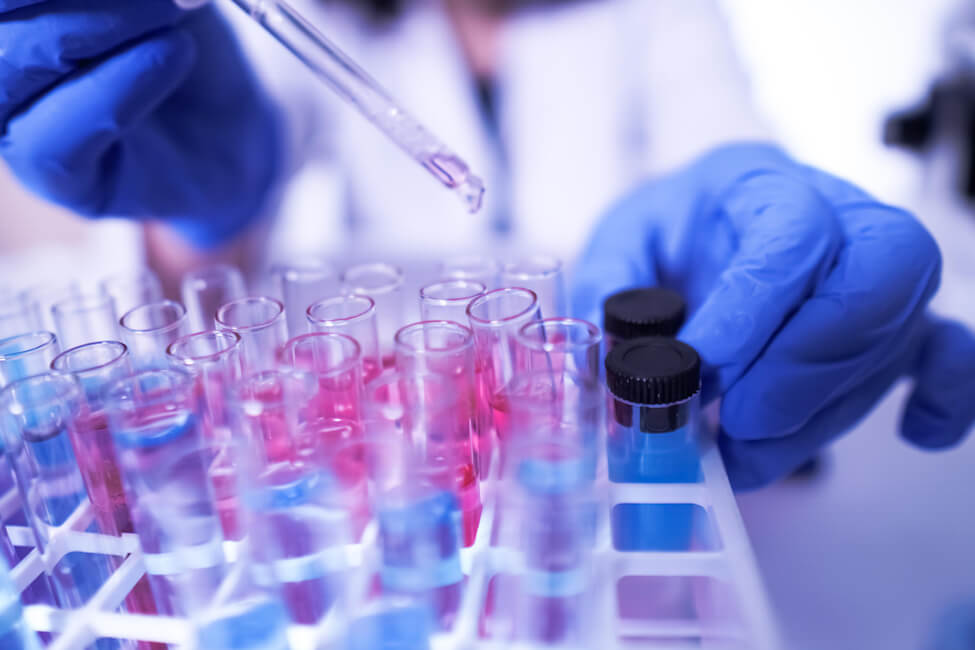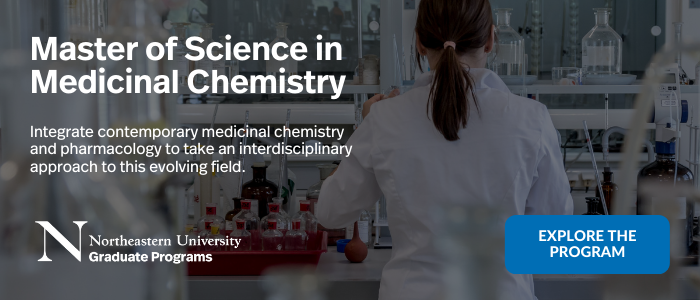Drug development is a long, complex process that requires collaboration amongst various teams during each of its stages, including research, lab testing, human trials, and FDA review. Each phase requires a different type of expertise. Those seeking a hands-on role in this process may choose to study medicinal chemistry, a type of pharmaceutical chemistry that focuses on creating pharmacologically active molecules that ultimately become drugs.
Read on for more information about this career path, and learn how to get started in the pharmaceutical chemistry field.
Advance Your Career with a Master’s in Medicinal Chemistry
Learn how to transform your career in an industry that’s transforming the world.
What is Medicinal Chemistry?
Medicinal chemistry involves the creation and refinement of molecules for the purpose of creating or improving drugs. It is grounded in synthetic organic chemistry, a discipline in which scientists combine small molecules to create new ones.
“The output of medicinal chemistry would be drug-like agents that can then go on for testing for their ability, in pre-clinical models, to ward off or reduce disease symptoms,” says David Janero, director of Northeastern’s pharmaceutical sciences graduate programs.
These drug-like molecules are then further refined during the drug development process. After they are created, other scientific teams determine the safest and most efficient ways to deliver the drug to a patient’s system. It can then be submitted for FDA approval and produced for use in medical settings.
Medicinal chemists also improve existing medications by optimizing the structure and properties of molecules. These adjustments can make it easier for a medication to do its job, enabling higher-quality medical care to patients.
While other areas of pharmaceutical science focus on the analysis and testing of molecules, medicinal chemistry concentrates primarily on the design of molecules. As such, it’s ideal for scientists who prefer taking a hands-on, creative approach to their work.
“A person in this field would be interested in designing drugs and contributing in this way to therapeutics or healthcare,” Janero says. “They have a bent for chemistry and want to work in or supervise a lab in a pharmaceutical, big pharma, or biotech company.”
Pharmaceutical chemists in this field typically collaborate with a team of scientists that includes biologists, toxicologists, pharmacologists, and more to analyze, create, and test new drug products.
Jobs in Medicinal Chemistry
Earning your master’s degree in medicinal chemistry positions you for a job as a synthetic or medicinal chemist, Janero says. In these roles, you’ll study, research, and develop molecules that will later be tested for their efficacy as drugs. Though these roles have various titles in the industry, from “synthetic chemist” to simply “scientist,” each focuses on the creation of molecules. In addition to experimental and developmental work, other job duties may include:
- Maintaining records of work
- Collaborating with project leads and other scientists
- Conducting research activity
- Presenting your findings to stakeholders within the company
Scientists interested in furthering their careers can earn a PhD in a related field and progress to supervisory positions. Instead of creating molecules, the majority of your time in a role like this would be spent managing various experiments and processes within the lab. Job titles in this area include project leader or lead research investigator.
Medicinal Chemistry Skills
Becoming a medicinal chemist requires specialized training that goes beyond knowledge of synthetic organic chemistry. Successful professionals in this field will also need a strong background in biology, critical thinking abilities, and a suite of technical skills.
Here are some of the fundamental skills and abilities you should develop to be a successful medicinal chemist:
- Design and execution of experiments
- Ability to purify and identify products and compounds
- Data analysis and mathematical modeling
- Development of scientific models and simulations
- Ability to conduct research and stay abreast of industry advancements
- Use of creativity and critical thinking skills to solve issues and explore novel drugs and development methods
- Effective cross-functional communication
- Project and time management
While many of these skills are related to your scientific thinking, the ways you communicate, collaborate, and handle problems are equally important. One of the most effective ways to learn and practice both technical and soft skills is by earning an advanced degree in medicinal chemistry or a related pharmaceutical field.
Earning a Medicinal Chemistry Degree
“A master’s degree in this area opens the door to a job in the pharma or biotech industries as a synthetic chemist,” Janero says. “The Boston ecosystem is rich in those entities, and that’s where most of our students go.”
When you earn your advanced degree in medicinal chemistry, you learn all of the skills necessary to establish yourself in this field. You also gain valuable hands-on experience in labs through classes, projects, and internships with local organizations. Professionals who choose to pursue a PhD after their master’s program can further advance their careers and qualify for supervisory roles within the lab or careers in regulatory affairs, patents, and more.
Northeastern offers a robust co-op experience to help students take full advantage of the university’s proximity to Boston’s biotech and pharmaceutical hub. Top companies routinely hire Northeastern students for co-ops, many of which result in full-time jobs after graduation.
The university also offers several on-site labs that allow students to gain experience in a real wet lab setting and collaborate with faculty who have industry expertise.
“For example, I know what it’s like to run a project in a biotech company and lead it to an IPO with an FDA approved product, and through my continued consulting, I have a good feel as to the current context that students would be getting into after graduating,” Janero says.
Faculty with a strong connection to the industry can offer invaluable career mentorship and development opportunities to students, positioning them for success in both their education and careers.
For more information about Northeastern’s medicinal chemistry program, explore the program page here.







Related Articles
Compliance Specialists: Who They Are and What They Earn
Science or Science Fiction? The Future of Personalized Medicine
In-Demand Biotechnology Careers Shaping Our Future